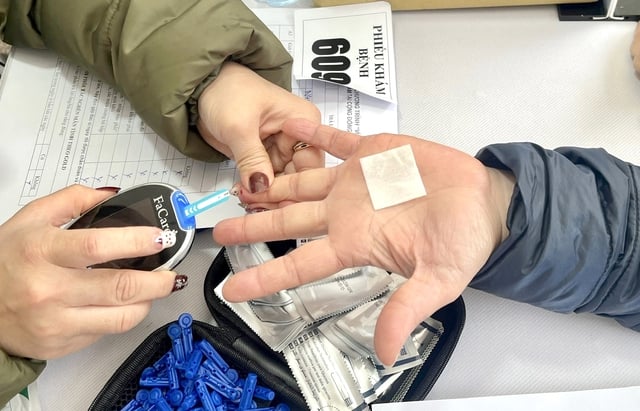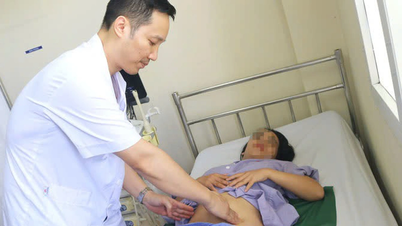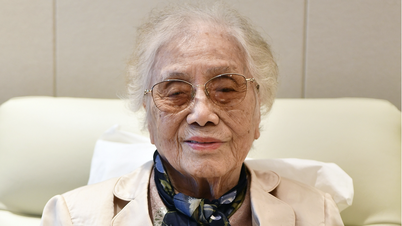Dr. Nguyen Quang Bay, Head of the Department of Endocrinology - Diabetes, Bach Mai Hospital (Hanoi), said that long-term outpatient prescriptions (over 30 days according to new regulations of the Ministry of Health , applied from July 1, 2025) bring many advantages but also raise some issues related to disease control.
Firstly, patients return for check-ups less often. Some patients, when they see that their condition is stable, are subjective, do not monitor their blood sugar and blood pressure, do not maintain exercise, eat irregularly, and easily stop taking medication.

People with diabetes or other chronic diseases need to monitor their health and comply with outpatient prescription medication.
PHOTO: LIEN CHAU
Second, not having regular check-ups can easily miss early warning signs of complications, or easily forget to schedule follow-up visits, leading to running out of medication. For people with multiple medical conditions, using many different types of medication, the possibility of running out of medication is even more likely to occur.
Dr. Nguyen Quang Bay noted: Chronic diseases require lifelong treatment. Stability is only temporary, if treatment is not maintained properly, the disease can worsen at any time. Therefore, patients need to read the prescription carefully before leaving the hospital, and ask immediately if there is anything unclear. Store medications carefully, especially insulin, which needs to be kept cold. Avoid confusing medications when there are many patients in the house. People with diabetes need to take or inject medication on time; you can set an alarm or leave the medication in a visible place to ensure compliance with treatment.
At the same time, it is necessary to maintain monitoring of health indicators such as blood sugar, blood pressure at home or at the medical station. When there are unusual symptoms, do not wait until the appointment date, go to the doctor immediately or call the doctor or hospital hotline. Make a follow-up appointment 3-5 days in advance to avoid late medication.
For cancer patients, Associate Professor, Dr. Pham Cam Phuong, Director of the Center for Nuclear Medicine and Oncology - Bach Mai Hospital, said that outpatient prescriptions for more than 30 days, maximum 90 days, are currently issued for 3 diseases: thyroid cancer, breast cancer and non-small cell lung cancer.
However, Associate Professor, Dr. Pham Cam Phuong emphasized: "These diseases must be treated stably before they can be given medication periodically every 3 months and no more than 90 days." However, it is also important to note to staff, doctors and patients that cancer patients can progress, relapse, or metastasize at any time, so if the patient has unusual symptoms, increased symptoms, or coughs, chest pain, feels uncomfortable and any other abnormalities, they must come for a check-up early, not waiting until the medication runs out to see a doctor as scheduled.
At the same time, the doctor will decide to prescribe medication for 30, 60 or 90 days, or maybe 1 - 2 weeks earlier, depending on the most recent examination, as well as have appropriate instructions.
The doctor is responsible for giving detailed instructions to the patient.
To serve outpatients with prescriptions for more than 30 days, Dr. Nguyen Quang Bay shared: At the hospital, related departments need to proactively adjust the process; prepare enough medicine to meet the number of dispensing increased by 2-3 times the normal; increase human resources in the examination, prescription and dispensing stages; upgrade the information technology system to ensure smooth communication between doctors - drug warehouse - pharmacy. At the same time, doctors are also responsible for providing detailed instructions to patients: which medicine can be prescribed for 30 - 60 - 90 days, make a specific appointment; provide hotline numbers, Zalo or the hospital's application so that patients can contact when having unusual symptoms or need to ask more questions.
Source: https://thanhnien.vn/don-thuoc-ngoai-tru-dai-ngay-luu-y-can-biet-voi-nguoi-co-benh-chron-tinh-185250707204118561.htm





![[Photo] Prime Minister Pham Minh Chinh receives CEO of Samsung Electronics](https://vphoto.vietnam.vn/thumb/1200x675/vietnam/resource/IMAGE/2025/8/26/373f5db99f704e6eb1321c787485c3c2)
![[Photo] Prime Minister Pham Minh Chinh chairs meeting of National Steering Committee on International Integration](https://vphoto.vietnam.vn/thumb/1200x675/vietnam/resource/IMAGE/2025/8/26/9d34a506f9fb42ac90a48179fc89abb3)

![[Photo] Brilliant red of the exhibition 95 years of the Party Flag lighting the way before the opening](https://vphoto.vietnam.vn/thumb/1200x675/vietnam/resource/IMAGE/2025/8/27/e19d957d17f649648ca14ce6cc4d8dd4)


























































































Comment (0)